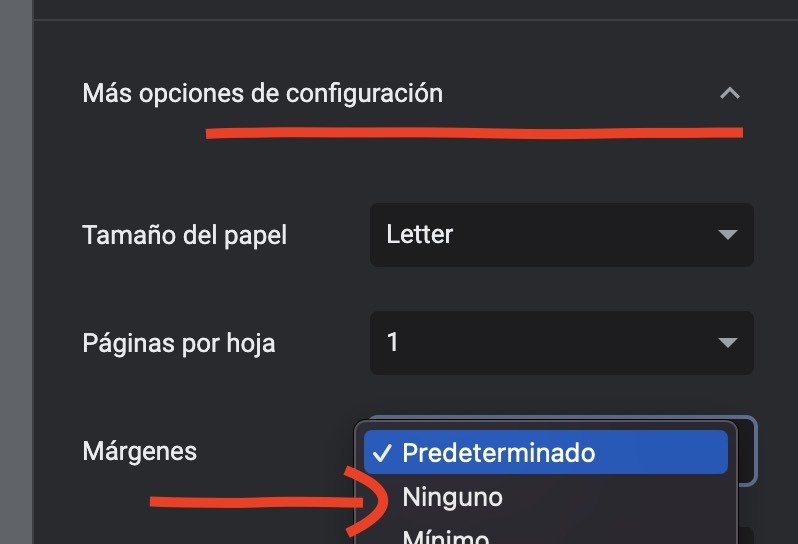English 3 Unit 1 Term 1 Week 4, 2025
Instrucciones:
• Los bloques sombreados en color gris se pueden ocultar en la impresión final.
• Para ello haga clic sobre cada uno de los bloques que desea ocultar.
• Para encenderlo nuevamente, pulse el bloque otra vez.
• Solamente los bloques encendidos serán impresos.
• Pulse el botón «Imprimir» cuando se encuentre listo.
• Para un mayor aprovechamiento del espacio, recomendamos eliminar los márgenes al imprimir.
¿Cómo guardar PDF?

Recomendamos utilizar el navegador Google Chrome.
Si no lo tiene instalado en su dispositivo puede descargarlo aquí.
El diálogo de impresión iniciará en cuanto cierre estas instrucciones.
En el cuadro de diálogo, cambie el destino de la impresión:

En las opciones, seleccione «Guardar como PDF»:

Para aprovechar todo el espacio de su hoja, recomendamos desactivar los márgenes:

Por último pulse el botón «Guardar»:

¿Cómo imprimir en color?

Recomendamos utilizar el navegador Google Chrome.
Si no lo tiene instalado en su dispositivo puede descargarlo aquí.
El diálogo de impresión iniciará en cuanto cierre estas instrucciones.
En el cuadro de diálogo de la impresión siga las siguientes instrucciones:
Si desea imprimir el planeamiento a color, asegúrese de activar la opción «Color»:

En la sección «Más configuraciones»:

Active la opción «Gráficos de fondo»:

Finalmente pulse el botón «Imprimir»:

School year: 2025
Period:
Term: I
Level: Third Grade
Unit:1
Week: 4
Domain: Socio-interpersonal
Scenario: My family “to do “ list
Theme: Where is the Broom?
Enduring Understanding: I can do chores around the house and help me and my family be happier.
Essential Question: How do you help your family every day?
General Competences:
Responsible Citizenship ( X )
Life Competences ( )
Competences for Employability ( )
Learn to Know
Grammar & Sentence Frames
Interrogative sentences beginning with “What.”; «Where»; «Who»
- What is this?
- Where is the broom?
Simple sentences with subject/object
- I need a broom.
Vocabulary
Where is the broom?
Household items
- Broom, washing machine, mop, wastebasket, dish washer, dustpan, ironing board, bucket
Prepositions:
- In front of, next to, on, in
Expressions:
- Where is the dustpan? It is next to the garbage collector
Phonemic Awareness
Vowel and consonant combination
ab: cab, lab, nab, tab,
Learn to Do
Function
- Nasking and answering questions about location of house items
Discourse Markers
Because
- I love you to pieces, because you are my Mom.
Learn to Be and Live in Community
Psycho-social
- Learning how to handle emotions and emergencies in the family.
Social Language Samples
and idioms/phrases
- There is no place like home.
Assessment Strategies & Evidences of learning
Learner…
Goals
Learner can…
Pedagogical Mediation/ Didactic Sequence
Pre-teaching
Warm up
The teacher asks two students to come to the front of the class.
The teacher places the students beside each other and shows how one is next to the other.
___ student’s name ___________ is next to ____ student’s name _________.
The teacher places one student behind the other and show their new position to the class.
_____ student’s name __________ is in front of _____ student’s name ________.
_____ student`s name __________ is behind of ___ student`s name __________.
The teacher asks one student to sit on a chair at front of the class and show his/her position.
_____ student’s name _____________ is on the chair.
The teacher puts some trash paper in the waste basket and shows students its position.
The trash is in the waste basket.
Activation of Prior Knowledge
The teacher asks some students questions about their positions in relation to their classmates or objects in the classroom.
The teacher may use objects such as a desk, the door, a window, a chair, the broom, the mop or the waste basket.
Where is _____student’s name______?
Doing the laundry
Ironing
Making the bed
Dusting
Vacuuming
Students brainstorm what tools or machines you need to complete those chores. The teacher writes them on the board next to each chore.
Time
L.2. Responds to comprehension questions about the location of household items.
SI.2. Interacts in a simple way, when talking about the location of household items, provided others are prepared to repeat, rephrase, and speak slowly.
L.2. respond to comprehension questions about key vocabulary words that have been modeled, repeated, or labeled.
SI.1. interact in a simple way provided others are prepared to repeat, rephrase, and speak slowly.
Modeling
The teacher asks students to observe page 18 and asks these questions:
Where is the grandmother? The grandmother is next to the sister.
Where is the boy? The boy is in front of his father.
Clarifying
The teacher explains the positions one more time if needed.
Oral Comprehension (Listening)
Pre-task
Students look at picture on page 18 and label the different positions of the following items according to the sentences.
- My mother lies down on the grass.
- The CD Player is on the table.
- My little brother is next to my father.
- The apples are in the basket.
- My grandfather is in front of the table.
- My grandmother is next to my sister.
Task completion
Students follow the instructions and label the correct prepositions below each picture in the fodable.
Students write a sentence using the preposition inside each tab.
Task assessment
Students observe page 29 in the book and answer orally to the teacher`s questions.
- Where is the T.V.?
- Where is the Closet?
- Whre is the plant?
- Where are the books?
- Where is the chair?
- Where is the toilet?
Possible answers:
- The T.V. is on the desk.
- The closet is next to the night table.
- The plant is on the shelf.
- The books are in the bookcase.
- The chair is next to desk.
The toilet is in front of the bath tub.
